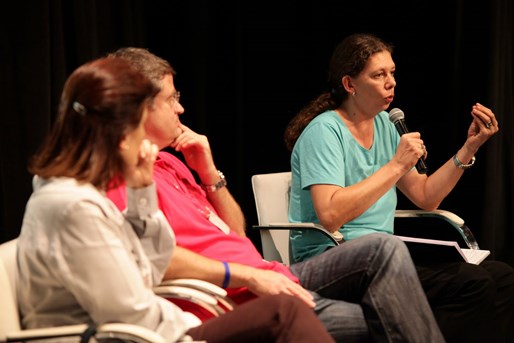World Cup and Olympics should make citizens active

Ana Moser (right) speaking at the Play the Game day in Brazil. Photo (c) Roberto Assem
In the host country of the next FIFA World Cup and Olympic and Paralympic Games there are numbers saying that 72 percent of Brazilians are not doing sport, and that 62 percent of people over 16 years are physically inactive.
Such figures make Ana Moser, former volleyball star and president of Atletas pela Cidadania (Athletes for Citizenship), call for action as she did during the Play the Game day in São Paulo 24 October:
"In Brazil, we have no culture of training or taking part in sports, not even among children. Sport has always been associated with elite sport, which has had the access to the facilities. But we want universal access to sport for all."
This desire was emphasized at the final round of debates in which three leading Brazilian sports voices discussed the paradox that a hosting country of mega-events has no national strategy for sports development in a time when investment and construction in stadiums, roads, airports and other facilities for the mega-events are in full swing.
Ana Moser did not appreciate the initiatives taken so far by the government to stimulate participation:
"They think that a national school championship of any marginal sport is going to solve the problem, but it won’t. Only a few people are taking part and it doesn’t work. We need responsible leaders to change this situation.”
Democracy is not medals
A second speaker, the renowned blogger and investigative journalist Juca Kfouri spoke on the behalf of many as he criticised the politicians’ prioritization of funds for the two big events. The government should not worry about how many medals Brazil would get, he said:
"Democracy is not medals, but participation. We have a lot of things to deal with before we think about how many gold or silver medals we are going to carry.”
In his eyes, Brazil will not get a Brazilian World Cup or Brazilian Olympics, but a German or Chinese in the sense that these events will bring nothing but big business and prestige in the form of medals.
"That’s how it goes in a country without a sports policy. We therefore wish for such a policy as a means of democratizing sport and society in terms of for instance increased public health."
The lawyer and former member of the Brazilian Olympic Committee (COB), Alberto Murray Neto, also emphasised that public money should not go to elite sports, but to the public base. He highlighted the fact that only 12% of the public schools in Brazil have sports facilities, according to the last official research.
From his point of view, improvements in this area can help to disseminate sporting culture.
“The public schools are the solution for sports in Brazil. We need to take classes of physical activity seriously and make sports a part of the life of children and adults”, Murray said.
Read more about the Play the Game day here
The article is based on reports by freelance journalist Camila Mattoso, São Paulo, and journalist Steen Bille, Danish Gymnastics and Sports Associations. Their articles have been edited and amended by Play the Game.





